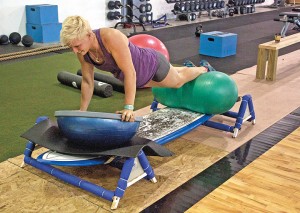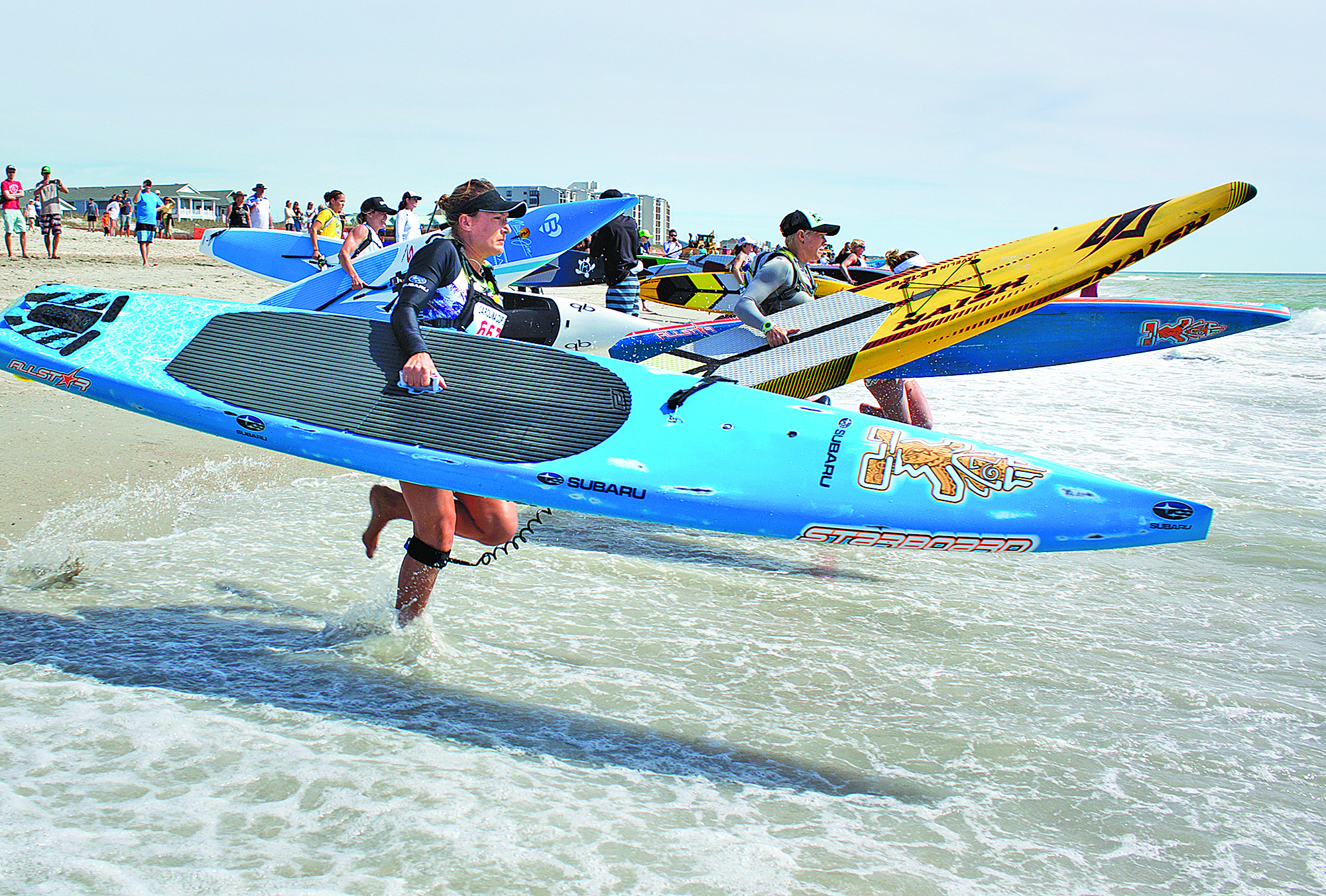“It feels like you’re a gladiator. … It’s really noisy and you feel like you’re about to enter this coliseum of lions … and then right before it starts the noise goes away and your heart is beating through your chest,” April Zilg said, envisioning the moment on the beach alongside legends of her sport Saturday, April 25. She will stand poised for the start of one the most challenging paddleboard races in the world.
“And then they blow the horn … and it’s happening,” Zilg said.
Zilg and 200 other elite standup paddleboarders will run to the water, leap on their boards and punch through the surf to reach the open ocean. Nearly six months of mental and physical preparation will be tested as the racers begin the Carolina Cup’s Graveyard Elite course, a grueling 13-mile loop around Wrightsville Beach through open ocean and flatwater channels.
The fifth annual Carolina Cup consists of four races, but the Graveyard Elite course is its daunting centerpiece, this year drawing 24 of the world’s best 30 paddleboarders. The list includes the top-ranked male and female paddlers, Connor Baxter and Annabel Anderson, as well as three-time Carolina Cup champion Danny Ching.
“Knowing that the top paddlers from all around the world are going to be here in the next few days,” Zilg said, “I can sit here and tell myself to visualize success and breathe and relax, but my heartrate is going through the roof.”
While the opportunity to take on world champions is a rare experience in itself, Zilg has reason to believe she can give them a good race. In 2014, during her first attempt at the Graveyard Elite course, she finished in the top 10. This year she hopes months of intense training will propel her to an even better result.
“I’m hoping to move up the ranks just a little bit. … I would really like to win,” she said.

A typical “on” week involved an intense 90-minute gym workout Monday, Wednesday and Friday. She supplemented gym time with distance paddles, interval paddles, running and yoga.
“It’s astonishing how much of your life is suddenly absorbed when you have a goal, something you’re really aiming for,” she said.
Another East Coast standout, Virginia Beach paddler Steve Dullack, said successful preparation for a world-class race is just as much in the details as it is in long hours logged in the gym and on the water.
He and his training partners drill beach starts over and over again to prepare for the chaotic beginning of the Graveyard Elite course, when hundreds of racers of varying abilities try to navigate past the breaking waves into the open ocean.
Practicing the finish of the race is equally important, he said. Racing boards that cut through flatwater so efficiently are cumbersome to surf in to shore, especially when the racer is mentally and physically exhausted.
Race-day nutrition can also give paddlers an edge, he added. Three hours before the race he eats a large bowl of oatmeal, then an hour later an avocado and a banana, then right before the race an energy gel with a variety of carbohydrates the body absorbs at different rates.
In his race-day CamelBak he keeps a nutritional solution he concocted based on his sodium, potassium and electrolyte needs during the race. To keep the drink cold, he said he freezes cubes of the mixture so they don’t dilute the solution as they melt. During the race, he wears a GPS that vibrates every mile so he knows when to take a drink.
Despite the exhaustive preparations, once the race starts it becomes a mental and physical battle of adapting and persevering, he said. Two years ago he was nearly taken out at the start of the Graveyard Elite race when a wave knocked another competitor’s board into his own, punching a hole in it.
The flatwater leg in Banks Channel is no less challenging than the open ocean, he added. It’s possible the paddlers will be racing into the current, in which case he said he’ll try to find what he calls the “escalator,” or a narrow eddy near shore that flows opposite to the current.
“A lot of races only have one facet of paddleboard racing, but this has everything,” he said. “It’s the most technical race I’ve ever done.”
Zilg said she’ll lean on her local knowledge to navigate the swirling water in the channel and hope to sneak past her competitors from Australia, New Zealand and Canada as they race through the inlet.
“I’m going to choose maybe a slightly different line if I think it will put me in front of them,” she said. “Maybe hide behind some dude and pass them and they won’t see me. … Once we exit the inlet I’m going to cut that corner hard and try to break away.”
The paddlers will then race back through the open ocean to the finish, pushing their tired bodies with adrenaline-fueled determination. Zilg said in those moments, each time she digs her paddle into the water she’ll remember a person in her life that believes in her.
“When I’m feeling tired, I start listing off everybody’s names that I know thinks I can do it,” she said. “I’m like, ‘Oh, if that many people think I can do it, then maybe I can.’”
email [email protected]




